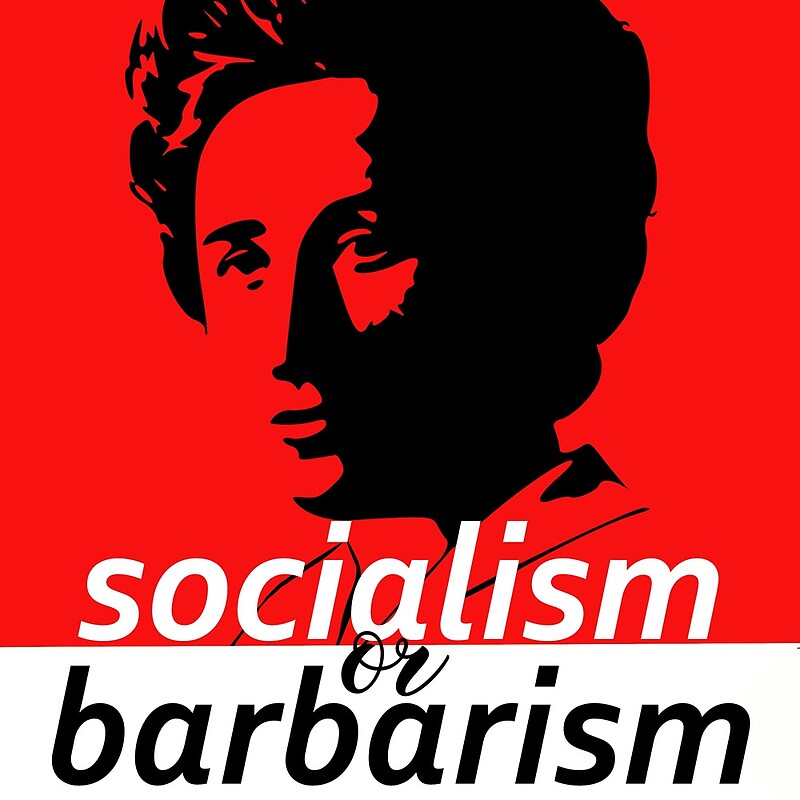With the fires in LA it’s hard to feel optimistic about the future. I want to be reminded that all is not lost, we need to do a lot that likely won’t be done but there are still things to do.
So let’s say Climate Stalin became Supreme Leader of the World or just President of the United States tomorrow. Whats next? What steps do we take to stop climate change getting worse and mitigate the damage we’ve already done?
-
Nationalise all polluting industries, decouple them from the profit motive and public investment, decarbonise as much as possible
-
Shift production so that it’s as sustainable, localised, and decommodified as possible. Meet the needs of the people and empower them to fulfill those things
-
Massive investment in mass transit, bike infrastructure, and subsidies for non-car transportation.
-
Protect and expand existing natural areas, overfund the agencies dedicated to preserving them
-
Invest in rural communities to encourage a more even population distribution
-
Focus on high density urban development with biodiverse parks and urban forests. Every city should be a garden city.
-
Shift the military’s priority from warfare to climate resiliency. Turn it into a job corps that builds sustainable infrastructure
-
Completely subsidise education in fields that promote climate resiliency and recovery from natural disasters, encourage climate change awareness at the primary/secondary school levels.
-
Shoot every billionaire in the stomach and leave them outside the city limits
-
Encourage artistic movements like art nouveau to promote a cultural reverence for nature, artisanal labour, and home craftsmanship. Encourage homesteading and gardening to create a more robust and local food supply.
Shoot every billionaire in the stomach and leave them outside the city limits
Make this #1 and I’ll give my life to this project
deleted by creator
High density cities are ideal for resource consumption, but commuting out of one to do agricultural work from sunrise to sunset isn’t ideal. Part of the antithesis between town and country is that rural communities are so underdeveloped that nobody would want to live there and those who do are subject to additional alienation. Agriculture is something that a single digit percentage of the population already born into it does. I go ten miles outside of my current city and there are suddenly no bike paths, no libraries, no decent schools, and no quality internet/water/power. There are just massive cattle ranches and corn farms that pay minimum wage. By investing in those communities and making them livable, I want to expand who participates in food production and reduce the land consolidation under a few ranching/farming businesses who only have an incentive to deplete the land because the scale of their production is so industrialised.
One important angle of this issue is that people in cities don’t feel a direct connection to nature or natural production. They’ll eat bananas in December without thinking of the cost of a 10 cent banana, and the supply side responds by always ensuring there are bananas in December regardless of the impact on those communities growing them. I want a society in which most people have some kind of direct connection to nature which depends on their stewardship of it.
I want to expand who participates in food production and reduce the land consolidation under a few ranching/farming businesses who only have an incentive to deplete the land because the scale of their production is so industrialised.
Surely it’s better to collectivise the farms and reduce the number of people working in rural areas as much as possible? Sure, a connection to nature is nice, but fundamentally, the reason that people in cities are so much more efficient is they don’t need or want to travel long distances and you can centralise utilities and resource distribution as a result.
Moving as many people out of rural areas as physically possible also makes reintroducing wilderness much more viable. If we can eliminate animal agriculture and rural settlements, we can free up a lot of space for actual natural habits for native wildlife.
Alternatively I like the Soviet system that was described in This Soviet World: https://comlib.encryptionin.space/lib/html/this-soviet-world/1gylc41d_files/chapter10.xhtml
Large farm collectives where everyone is engaged in science and communicating with each other. Every farmer becomes a participant in one project that’s centrally planned. Perfectly acceptable as well, challenges part of the alienation Marx described. That’s still industrialised production though. Even if the cotton is grown on a collective the Aral Sea drains to supply that collective water. If the industrial dairy next to the nearest rural community was a co-op, it’d still poison the water there all the same. All of our eggs still get put in a handful of baskets during an era of more frequent natural disasters while the dang cityfolk still get to make commodity fetishes out of the food they have no connection to.
As a counter-example to that, my city is the rudimentary liberal form of what I personally want. The core is a biodiverse urban forest with 60~ parks connected by biking trails. If I ride my bike down the trail 5 minutes, I come to a CSA where I can buy fresh vegetables and volunteer since I don’t have the lawn to garden myself. If I go in the other direction, urban homesteads and plant nurseries extend for the length of the city. The worm farm is next to the therapy horses and a few houses down from the vegetable farm that accepts foodstamps. At the edge of that my partner’s father has turned his lawn into an orchard while his neighbour runs a nursery. I want people in general to have that kind of primary connection to the land, like the medieval European culture of feast days tied to the seasons and yeomen farmers making things for their direct community. That’s their personal self-sufficiency, direct connection to science and nature, and understanding of how complex crop production is when they go to a grocery. I want a high density core surrounded by homesteads surrounded by collective farms surrounded by wilderness areas with train access to all of them.
edit: Also by “flatten the population distribution” I don’t mean it in as extreme a sense as Engels did. Those agricultural communities are small by default and forcibly moving people into them won’t help. I just mean investing in those communities so that they have the same basic services as urban ones. Crime accurately described every rural community near me in her reply, including the one I lived in just 10 miles outside my current city: https://hexbear.net/comment/5805944 . Despite food production being the main industry, it was effectively a food desert. I couldn’t afford decent housing because it was all detached single-family homes. My water was poisoned by the industrial dairy next door that I didn’t profit from. The only local library is one room while the cultural outlets consist of evangelical churches that you can only reach by car. Now they’ve built a single high school, but otherwise you have to do a 10+ mile drive on sketchy roads to go to primary or post-secondary education. There isn’t a single park or bus to get to the wilderness areas 15 minutes away. I think all of those need to change regardless of the agricultural model because those things breed reactionary resentment of the cities they supply. Living in those communities shouldn’t be an immediate downgrade to half a century ago.
deleted by creator
Switzerland is an example of great rail infrastructure for rural areas. There are bus services to nearly every town, even if it only has 100 people. The rail services also stretch deep out into the countryside, with interurbans and rural rail lines servicing many small towns. This allows people to live in the countryside car-lite or car-free.
Switzerland is still quite densely populated even in rural areas though, a lot of the land area is not inhabitable and even with that included, it’s almost eight times denser than the US and twice as dense as France.
I live in a rural farming town, population has always been <1k people, flyover state, about an hour by car to the nearest city. Everything is walkable. We used to have passenger rail service before they dug up the tracks, and there’s rail lines still operating near by that wouldn’t be too hard to hook up to. Having rail infrastructure is good in general since quite a lot of food is grown here and needs to be distributed out either way. Seems not-terribly-complicated to use the same rail infrastructure to bring goods in and move people to/from the city.
In order to make the town more appealing so people didn’t need or want to leave it as frequently (thereby reducing carbon footprints here), you’d need to add healthcare (doctor, dentist, optometrist, pharmacist, etc or one person who can do the basics of most/all of it plus some staff to support them), re-open the school that got shut down by libertarian experiments so kids didn’t need to go to a neighboring town for education every day, and reduce the cost of groceries in town (which is literally 2x as expensive as in the city). Some version of a food truck schedule or other rotating restaurant situation would be good too for more variety (the only place that serves food is the bar which only does artery-clogging fried stuff and meat). You’d also need to add more stuff to do and places to hang out besides churches — there’s a park and a walking trail and a basketball court, but it’s pretty boring otherwise.

-
People get all squeamish when you say the word ‘rationing’, but rationing
This. Imagine Americans being told that they’re only allowed to watch Netflix and browse the internet for 4-6 hours per day. They’d rather burn the whole planet down than to have their treats taken away.
They aren’t called Treatlers for nothing.
Under rationing in the UK, most people ate better
Edit, because I just realized this is kinda ambiguous — working class people under the rationing system ate more
Those aren’t hugely energy intensive activities though. You’d save more energy by banning dryers and regulating air conditioning/heating down to normal levels for non-US countries. You could probably bring American energy consumption down to near the average just by limiting the size of cars.
You could probably bring American energy consumption down to near the average just by
limiting the size of cars.shooting a couple of billionairesYeah I’m not a FALC bro at all, but we can actually have nice things — there’s so much low hanging fruit to go after before normal people even begin to feel the pinch.
Step 0 - Purge 99% of US cops, politicians, and kulaks
Step 0.5 - Laugh at the memes about it
Continue with happybadger’s plan
Everybody who’s ever chartered a private flight gets the wall.
No more road expansions.
Everybody takes the train.
No more fossil fuels.
Take all wealth over 2 mil and use it to build public transport and renewables.
Red meat is like a once a week thing.
Companies that use engineered obsolescence get privatized.
And maybe less necessary but massively expanding public spaces so people actually had a place to go and socialize rather than all using the internet 10 hours a day.
And it would have had to happen 15 to 20 years ago.
Basically what China is doing right now but with even more investment in rail. China is doing really well with high speed rail but still is spending far too much money on roads.
I would start with China’s infrastructure strategy, but add on top:
-Decimate the road budget and spend it all on trams and trolleybuses. Ban the sale of new cars.
-Ban the use of semi-trucks and build electric freight rail to all industries.
-Build more rural rail lines, all electrified, to serve the community, and use timed transfers to allow for lower frequencies (what the Swiss do)
-Shut down all fossil fuel plants as soon as possible
-twice daily or more freight service to all industries to make up for lost truck capacity
Uhhh now that I look at it this is kind of what Switzerland is already doing. The main difference is that the Swiss are reliant on extractive markets in other countries and are in no way socialist. Nonetheless, the Swiss rail network is excellent and well worth emulating in many facets.
https://www.epa.gov/ghgemissions/sources-greenhouse-gas-emissions
All the electric power could be nigh-carbon-neutral on the big scale if you just did nuclear power, that’s a quarter off.
Transportation is basically just cars, planes, unelectrified train lines and not much else.
Agriculture is basically mostly down to animal products and stupid shit like growing wheat in arizona or whatever
If you were climate stalin, a 5 year plan would be enough of a timespan to knock down US Emissions by about like half.
What would be the consequences of just banning air travel? Do people really need to do it?
I mean people do have loved ones across distances. They also love driving cars, eating meat and many of them hate nuclear power
The point I’m trying to make here isn’t necessarily that’d be easy to do, but that it would be simple to do.
Two massive projects have to happen in parallel:
-
Replace or retrofit everything single device and industrial process that uses any type of fossil fuel as an input and replace it. That means every single IC motor, every single gas powered heating element, every single chemical process that uses fossil fuels as an input - every single one of those in the world needs to be replaced.
-
Start spamming out nuclear power plants, cover every single roof in solar panels, and build tons of new transmission lines. We could eventually decommission nuclear plants (I’m sympathetic to the proliferation and waste concerns), but we need them as a stop-gap solution.
Bringing up Stalin in this context is useful actually, because it demonstrates that this scale of thing is possible to do, and has in fact happened in history.
Plans for waste are greatly exaggerated and haven’t there been new scientific advancements that help make them more recyclable?
Kind of sort of. The main thing with nuclear is it can take 15 years to build a plant. It was the answer 2 decades ago. At this point we need something NOW and with increasing efficiencies of batteries and solar I personally think we’d be better off leap frogging the majority of nuclear projects.
We can do both. We are limited in input materials for solar and wind, and those materials don’t overlap much with what nuclear power plants need.
Nuclear waste storage is nonexistent for political reasons, not technical ones. It’s much cheaper to dump it in Africa than to hollow out Mt. Yucca.
-
Nuke plants and electrify everything. Absolutely everything needs to be electrified, treat production needs to stop tomorrow, the global north needs to institute massive degrowth that won’t feel like degrowth to anybody but the owners of vacation homes, and we need a fuck ton of nuke plants. We can worry about removing carbon from the atmosphere after we’ve electrified everything, and can pour our new massive power surplus into super power intensive carbon removal machines that make no money.
There’s not enough uranium for enough nuclear plants (though China and India have those thorium reactors)
There are only two thorium reactors in the world (one in China and one in India) and they are both highly experimental. There isn’t enough ground based uranium (most uranium is in the ocean and technology to develop oceanic uranium mining is promising) for 100% nuclear power, but there is enough for a lot more. The reason why nuclear power isn’t more widespread isn’t a technical one, but rather it costs more than fossil fuels and nuclear power is contrary to the interests of the bourgeoisie.
nuclear power is contrary to the interests of the bourgeoisie

There’s not enough uranium at the ideal enrichment levels that’s profitable to extract. If we aren’t concerned with getting the most profit possible mining the stuff, we have a few hundred years of supply without needing to recycle (which is easy).
Implement a system of eco-credits that accrue over time and allow people to buy luxury items when the credits fill up. Like okay, you waited X number of years, you can afford a small boat or whatever your hobby is.
Ban meat, except as byproducts from things like prairie restoration projects. Let people go nuts on that wild buffalo steak or whatever once a year on Christmas or something as a treat, if they want.
Implement a system of eco-credits that accrue over time and allow people to buy luxury items when the credits fill up. Like okay, you waited X number of years, you can afford a small boat or whatever your hobby is.
Alternatively, library socialism. I want municipally-owned power tools and vehicles that people can check out as needed or use in municipal workshops/co-ops. I shouldn’t have a consumer incentive to buy anything I’m going to use a couple times per year or buy the shittiest version because I can’t afford one that will last. If a consumer good can be repaired, I should never feel like the path of least resistance is throwing it away with no obligation to preserve it. The poorest person in that city should be able to use the same boat the wealthiest person can with equal opportunity to better themselves with it.
Let people go nuts on that wild buffalo steak or whatever once a year
The Purge: Carnist Edition
my hot take is that on top of everything else people have been mentioning, we are going to have to do some form of intentional geoengineering. I understand that this is a big risk, but it feels like we’re starting to get to the territory where we have to take risks, even if they might cause famines that kill millions etc. because if we don’t the consequences would be far worse. fitting for a “climate stalin” scenario too, considering the strategy the USSR had to use to industrialize under Stalin
I agree, and the “throw a bunch of iron shavings in the ocean” option seems relatively low risk from what I understand?
i’m sure every project is inherently risky just because we dont have models accurate enough to actually know how risky something is, but it does seem like a better idea to me than simulating massive volcanic eruptions with sulfur dioxide lol, which is what I normally see get brought up as the first option
as far as what i think is the best option, im not well informed but i remember stumbling upon this wikipedia article some months back https://en.wikipedia.org/wiki/Passive_daytime_radiative_cooling , ive never seen anyone mention it before though so i assume it’s got some big drawbacks or something like that. but like this part:
Some estimates propose that dedicating 1–2% of the Earth’s surface area to PDRC would stabilize surface temperatures
seems very promising to me? i remember doing the math and even by the current (presumably higher) prices listed on wikipedia, it would only take a couple trillion of dollars or something like that? it was only like 2 or 3 years of the US defense budget iirc, although I suppose this doesnt account for labor costs
- Ban personal car ownership unless you have a good reason to own one
- Ban air travel unless you have an extremely good reason to fly and no viable alternatives
- Massive investments in rail and other transit infrastructure
- Heavily disincentivise needless imports and stimulate much more local supply chains
- Massive investments in nuclear and sustainable energy
- Strict energy efficiency, repairability and longevity standards for consumer products
- A programme of insulation and similar improvements for all buildings
- Make the wasteful lifestyles of the rich impossible by liquidating the rich as a class and seizing their excessive assets
- Oligarchs, fascists and the like gets shot
That last one has to be first. Fossil fuels aren’t being burned by themselves and unless you get rid of these people they will come back and do the same shit or worse.
I agree with this. If you don’t liquidate them as a class, then you’re constantly at risk of bourgeois restoration. They will do whatever it takes to undermine progress.
Obviously he’d nationalize the energy and transport sectors as well as heavy industry. Then: rapid cessation of fossil fuels for energy production, immediate installation of vast arrays of renewable and nuclear power plants, rapid public transit deployment, outlaw ICE cars, massive reforestation drives, redirect public research grants towards carbon capture, construct mitigating infrastructure to reduce damage from the existing impacts of climate change. And if he has the time, execute those responsible for doing this to the earth (oil executives, former presidents, etc) just for justice’s sake.
not sure what exactly is best meta but this game was fun
Join a party with Climate Lenin
Bulldoze wealthy suburbs and replace them with commie blocks serviced by adequate public transport and services. Replace a lot of centralised power generation with distributed renewables. Put more research into wood molding and plant a billion trees (not monocropping though) so that as much carbon can be locked in buildings, infrastructure, and furniture as possible. Merc billionaires until they voluntarily give up their wealth.
Edit: something about meat consumption


















